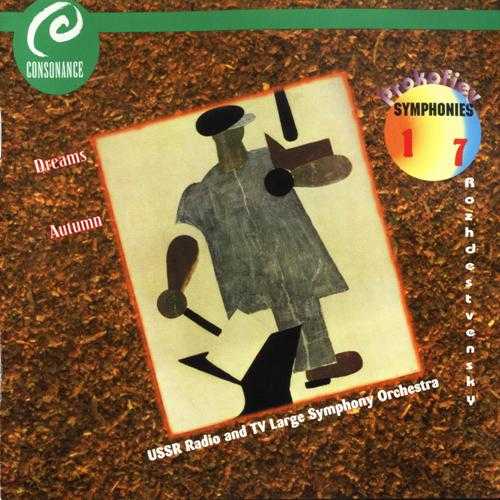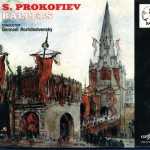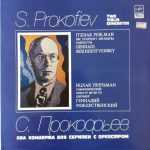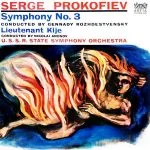
Orchestra: USSR Radio and Television Orchestra
Conductor: Gennadi Rozhdestvensky
Composer: Sergei Prokofiev
Audio CD
Number of Discs: 1
Format: APE (image+cue)
Label: Consonance
Size: 302 MB
Recovery:+3%
Scan: yes
# Symphony No. 1 in D major (“Classical”), Op. 25
Composed by Sergey Prokofiev
Performed by USSR Radio & TV Symphony Orchestra
Conducted by Gennady Rozhdestvensky
# Symphony No. 7 in C sharp minor, Op. 131
Composed by Sergey Prokofiev
Performed by USSR Radio & TV Symphony Orchestra
Conducted by Gennady Rozhdestvensky
# Dreams, symphonic poem, Op. 6
Composed by Sergey Prokofiev
Performed by USSR Ministry of Culture Symphony Orchestra
Conducted by Gennady Rozhdestvensky
# Autumnal Sketch, for orchestra, Op. 8
Composed by Sergey Prokofiev
Performed by USSR Radio & TV Symphony Orchestra
Conducted by Gennady Rozhdestvensky
excellent music and transcendent conducting by Rozhdestvensky
Prokofiev Symphony 1 and 7. Rozdestvensky, USSR Sym. Angel EMI.
Prokofiev’s first and last symphonies require modest forces and are considered as lighter works. Certainly the Symphony 1 has been a perennial concert favorite with its tidy Haydenesque dimensions and cheeky wit. Supposedly Prokofiev likened it to a tourist driving past the sights of Paris. The key issue is avoiding a mechanical reading. While avoiding cliches there aren’t any soaring themes to latch onto or dramatic outbursts to revel in. Everything depends on providing alert phrasing and carefully judging tempos.
Rozhdestvensky is competing with many other noteworthy ones starting with Koussevitsky and continuing with Bernstein, Ormandy and Malko. He adopts faster tempos than most others except Koussevitsky but somehow they don’t seem that fast. Part of the reason is that he adds a bit of Russian vodka to the figurations making them appear a bit ruddier than usual. This is a good strategy since it keeps the music from becoming either too cute or too polished.
The Symphony 7 (1952) has had a spottier history than the first. It was written when Prokofiev had become a physical invalid and it has a very enigmatic mood. It should be remembered that Prokofiev had been viciously attacked in 1948 by the Stalinist “culture” ministers (who really do deserve quotation marks). It features less dramatic and more lyrical sets of themes than Prokofiev used in his fifth and sixth symphonies. Sometimes it almost exhibits a childlike insouciance which at another angle might be a mask. Prokofiev had even altered the ending of the symphony, adding an energetic upbeat coda to please the commissars. It is often played in a light but warmly lyrical way such as Weller or Previn do or Malko with his more idiomatic phrasing.
Rozhdestvensky however, interprets the childlike pose as indeed a mask for the Soviet authorities. His interpretation doesn’t disdain the lyrical, but he does add a darker dramatic edge to it. This is evident in the first movement whenever the brass section enters. The tinkly bells later in the movement are soft and ostensibly toylike. However they assume an even more enigmatic cast since they appear after such a quietly ominous buildup. In the next movement, the Allegretto is kept within modest expressive bounds, but occasionally Rozdestvensky brings out a sardonic smile. The slow movement is kept warm and nostalgic but the final movement returns to the mood of the first even more strongly and almost seems to be building to an outburst which it never quite does. Instead the tinkly bells suddenly reappear and can’t be dislodged bringing an unexpected close to the symphony. Rozhdestvensky pointedly omitted the upbeat coda Prokofiev had been pressured into adding. An essential performance for all fans of Prokofiev.
The recording is rather good for the Russian label Melodiya (and its Western issues on EMI and Angel). There is excellent depth to the orchestra and the bells seem at the back of the stage adding to their mystery. There is adequate treble extension and air as well which benefits the strings. The one problem is a bit of congestion and graininess when the music becomes loud.




Much appreciated!
100.000.000.000.000 …… Thank You !!!!!!
Thank you very much.